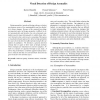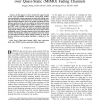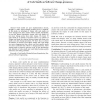1629 search results - page 54 / 326 » Infeasible Code Detection |
154
click to vote
ETT
2000
15 years 2 months ago
2000
The input-output weight enumeration (distribution) function of the ensemble of serially concatenated turbo codes is derived, where the ensemble is generated by a uniform choice ov...
103
click to vote
CSMR
2008
IEEE
15 years 8 months ago
2008
IEEE
Design anomalies, introduced during software evolution, are frequent causes of low maintainability and low flexibility to future changes. Because of the required knowledge, an im...
112
click to vote
IIE
2006
15 years 2 months ago
2006
Plagiarism in universities has always been a difficult problem to overcome. Various tools have been developed over the past few years to help teachers detect plagiarism in students...
107
click to vote
TCOM
2008
15 years 2 months ago
2008
In this paper, we derive closed form upper bounds on the error probability of low-density parity-check (LDPC) coded modulation schemes operating on quasi-static fading channels. Th...
151
click to vote
WCRE
2009
IEEE
15 years 9 months ago
2009
IEEE
—Code smells are poor implementation choices, thought to make object-oriented systems hard to maintain. In this study, we investigate if classes with code smells are more change-...



